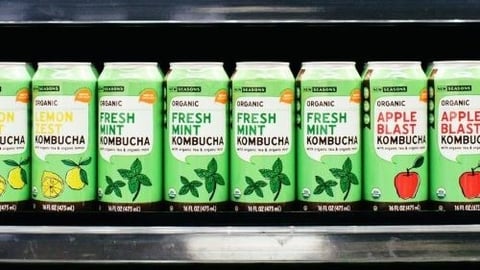Consumers' Evolving Coffee Habits Provide New Opportunities for Private Label
Coffee remains a popular drink of choice for many Americans, but the style of java being consumed on a daily basis continues to evolve, which is opening up new opportunities for private label growth.
Figures from Chicago-based market research firm Circana show that overall dollar sales for coffee for the 52 weeks ended Jan. 28, were up a modest 1.4% to more than $12.4 billion. Private label coffee sales were up 1.8% over that same period, with sales of $2.2 billion. However, private label unit sales were down 1.4% as compared with national brands, which saw sales off by 1%.
[RELATED: Private Label Sales Smash Another Record]
The largest segment in coffee — single-cup — also saw private label make gains, with dollar sales up 2.4% compared with national-brand products that were flat year over year. Unit sales for private label products were down 1.6%, with national brands down 2.1%.
Noteworthy in the single-cup segment is the difference in price per unit. Circana’s figures show national brands priced at $12.51 per unit, while private label products come in nearly $4 lower, at $8.67 per unit.
A deeper dive into the statistics from Circana shows robust growth for private label products brewing in several segments of the coffee industry. Dollar sales of store-brand instant coffee were up 18.4% for the 52-week period, which gave unit sales a boost of 5.8%. By comparison, national-brand dollar sales of instant coffee were up 5.3%, with unit sales up 1.1%
While private label products made gains in key coffee segments related to home brewing, momentum was missing with ready-to-drink products. Dollar sales in the cappuccino/iced coffee segment were down 39.3%, and cold-brew dollar sales were down 4.7%. Private label products account for a small percentage of overall sales in each segment.
While the Circana figures offer insight into the overall coffee category as well as the growing impact that private label offerings are having, the consumption habits of consumers continue to evolve.
Christine Dang, category manager at Los Angeles-based e-grocer Thrive Market, says that although coffee category sales have been flat, there continues to be an evolution in the style of the popular beverage that consumers are looking to drink on a daily basis. Most notable is the desire for many to seek out products with lower levels of caffeine.
“We’re seeing a shift toward other things such as tea matcha, where you have caffeine, but it is lessened,” she observes. “We are also seeing consumers shift to coffee that offers functional ingredients as well.”
Solange Ackrill, VP marketing and corporate strategy for Etobicoke, Ontario-based Club Coffee, notes that the research from leading coffee industry trade groups such as the New York-based National Coffee Association show past-day consumption numbers in the United States above 60%, making coffee the top beverage consumed daily. However, she acknowledges that despite those strong figures, consumer habits related to coffee are changing.
“While consumption is steady, where, how and what consumers are drinking is evolving,” she says. “We’re seeing growth in colder for younger entrants into the category, more at home due to a hybrid workforce and a shift to value and convenience.”
Experiments in Coffee
Multifunctionality is a growing trend within coffee as more consumers are seeking coffee that provides more than just a morning boost, but also ingredients such as mushrooms and adaptogens that help the body manage stress and restore balance after a stressful situation.
According to Dang, the growing popularity of coffee containing these ingredients is the result of consumers doing more research as they seek healthier alternatives. Also, companies and brands have expanded their marketing efforts.
“I think it’s really all about proper education,” she explains. “We have had these types of products for a while, but it was very niche. Now, with more education and marketing of these products, the consumer is understanding the benefits of these products and exactly what they do.”
Ackrill notes that consumers are experimenting with various methods in both hot and cold coffee and with additives such as nondairy nut-based whiteners like oak milk, and functional additives that include vitamin or protein powders.
[RELATED: Not Your Parents’ Store Brands]
Additionally, instant coffee, which traditionally is viewed as a choice for older consumers, has gained popularity with younger consumer groups. Driving this growth is the social media trend of “whipped coffee” that uses instant coffee. While this trend started during the pandemic, younger consumers have continued it post-pandemic, she says.
Seeking Value and Sustainability
As with every consumable category in recent years, economics have had an impact on consumer choices. As a result, Dang says that Thrive Market has seen a shift in its customer purchase habits to private label products as shoppers have sought to save money and find a better value. That growing desire for better value has led Thrive to launch value pack sizes.
“That’s been helpful to alleviate costs,” Dang notes of the value pack additions. “It’s more of an upfront cost, but our customers realized the savings over time. Our members are pretty savvy in terms of price savings.”
Club Coffee’s Ackrill says that inflation has affected the coffee choices of consumers, with private label brands representing everyday value and becoming more popular with shoppers.
[RELATED: What, Exactly, Is Value to Today’s Shoppers?]
“Higher prices overall have impacted what and where consumers are buying their coffee,” she observes. “For example, if a value brand raised its price and that price was closer to the price of a premium brand, consumers may choose to buy the premium brand instead of the value brand. Additionally, consumers are also shifting to alternate channels, from traditional grocery to clubs and e-commerce channels, if there is more choice and value.”
As with other retailers, Thrive has also seen private label coffee sales grow. While price/value is a key factor in consumers choosing the retailer’s own-brand coffee over national brands, sustainability is also playing a significant role in the decision-making process of shoppers.
Dang points out that Thrive’s coffee assortment has long been regeneratively grown, a process that includes several components such as crop biodiversity, minimizing water usage and ensuring farmers are paid a premium for the coffee beans they harvest.
“While regenerative growing has long been a big component of our coffee, we never educated our members about it,” she observes. “But they are starting to understand it more, so that adds to our sustainability message, along with the quality of ingredients we use.”













